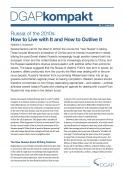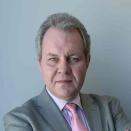Russia once again reminds Europe that it is still “a riddle wrapped in a mystery inside an enigma,” to use Winston Churchill’s phrase. Its evolution from a “normal country” into the main threat to the continent’s tranquility started at the end of the last decade, and the process is far from complete. I believe it will take quite some time to realize just how profound the consequences of such a change will be for all Europeans. This paper asks a number of questions: What happened in Russia in these years? How do the current trends relate to the self-awareness of the Russian people? What kind of goals is Moscow pursuing? And what shape should the strategies of both the EU and Germany toward their eastern neighbor take?
The New Russia: Some Striking Features
Beginning in 2000, Russia’s economic downturn gave way to a recovery. This was the result of a serious devaluation of the ruble in 1998 and was subsequently supported by the rising prices of oil and other major Russian exports. Oil was particularly important, since it was the main factor that permitted the new Russian political elite to stay in power. The country had in the 1980s and 1990s been steadily moving toward democracy, but once elected to the presidency, the former KGB officer Vladimir Putin surrounded himself not with competent people but with personally loyal ones. His clique would not have been able to run the country if the main goal had been creation of wealth rather than its redistribution.
Between 1999 and 2013, with each new period of Putin in power, oil revenues grew continually. It is worth recalling that Russia’s oil output in 1999 was 304.8 million tons, while the average price of oil stood at $19.97 per barrel. One can deduce the actual size of Russia’s “windfall oil earnings” by subtracting the total value of oil pumped in 1999 from oil revenues of each consecutive year. For the first period (2000–03), for example, it totaled $133.7 billion, or $33.5 billion a year; for the second period (2005–08) it was $894.4 billion, or $223.6 billion a year, while for the first part of Putin’s next term in the Kremlin (2011–13) it reached $1.3 trillion, or $394 billion per year. Such huge revenues allowed Putin’s power elite to commit practically any administrative error, tolerate unprofessional decision making, and engage in all kinds of acts of favoritism, as oil revenues pushed the country forward despite ever-growing corruption. Starting in the critical period of 2003–04, public office became regarded as a special kind of “business” that would bring the biggest amount of cash with a minimum of risk and responsibility. And Russia’s president, whose close friends had already turned into oligarchs, made it repeatedly clear – in increasing bellicose terms – that he would not tolerate any attempt to change the country’s course.
Meanwhile, as the first decade of the 2000s came to an end, there was a sense within the expert community in Russia that the ruling clique was in the process of choosing between two political systems: the “Mexican/Chinese” model on one hand (which allows for a change of leaders while essentially presupposing single-party rule) and pure authoritarianism on the other (when the head of state, once brought on, is elected for life). The choice was most likely made between 2010 and 2011, when it became clear that Dmitry Medvedev (the “acting President,” as Putin used to call him) was predisposed toward compromise and ready to take a “softer” stance against the West. Certainly the “Arab Spring” revolutions in the authoritarian regimes of the Middle East had a significant impact on how the Russian elite drafted further policy. So did Western efforts to overthrow the Gaddafi government in Libya, which disturbed them deeply. Meanwhile the rapid easing of the economic crisis and oil price recovery persuaded Moscow that the regime faced no danger from a financial point of view. Putin’s return to the presidency in 2012 indicated two things: that he would never give up the position voluntarily and that he had totally lost his hopes for any positive engagement with the West. These two facts determine the reality that I call “Russia of the 2010s.”
Russia of the 2010s is actually an authoritarian petro-state, controlled by people who consider public service to be a kind of business and the state their own private property. Elites are recruited on the basis of loyalty to the supreme leader and his appointees, so they focus on maintaining stability rather than on promoting development and change. The main element of the whole system is the exchange of loyalty for money; the leadership is keen to close its eyes to the “orderly” corruption and the misuse of any official position for personal gain if it allows the political system to stay under firm control. This of course causes a steep decline in the efficiency of public spending but still allows the country to develop along the lines intended by the leadership. Fully aware of the actual extent of the corruption, the Kremlin prefers to underinvest in many projects and to channel money into reserve funds. The regime’s most important feature is therefore the priority it gives to its current goals at the expense of any prospective ones. This in short offers a quite narrow horizon of planning and an inability (and unwillingness) to change the existing order of things.
All of this indicates that the system Putin created cannot be redesigned via mere reforms. It can only be dismantled by external – or internal – shocks. Vyacheslav Volodin, a stubborn deputy chief of staff in the Kremlin administration who famously coined the formula “No Putin, no Russia” at the annual Valdai Club session in Sochi last year, was in many aspects surprisingly correct. Today’s Russia will not outlive Vladimir Putin. Read more

